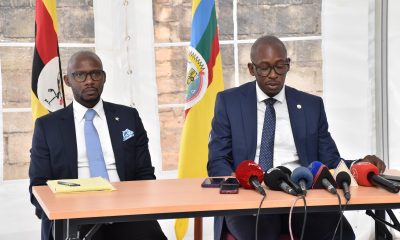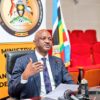Editor
UBC panic as Finance release funds for restructuring
The Ministry of Finance has released part of the funds earmarked for restructuring of Uganda Broadcasting Corporation (UBC), The Sunrise has confirmed.
Moses Watasa, the Commissioner Communications at the Ministry of ICT who is also the spokesperson of the Ministry, told The Sunrise that part of the anticipated Ushs18bn that was budgeted for the revamp exercise, has been released to kick-start the restructuring exercise.
Watasa told The Sunrise that the Ministry’s technical machinery will undertake the work of implementing the overhaul exercise and not hire an outside firm.
The long-anticipated revamping of the national broadcaster comes after the minister of ICT pledged to overhaul the institution following reports of chronic mismanagement and under funding.
Last year, the Ministry of ICT instituted a committee of eminent media and legal personalities that was chaired by Dr. Peter Mwesige, the Executive Director of the African Centre for Media Excellence (ACME) to find solutions to the corporation’s problems.
The committee investigated allegations of management of the organization by interviewing staff and management as well as members of the general public. The committee concluded that despite the many troubles the organization faced, it should not be allowed to fail.
In their report, the committee observed that UBC was plagued by ‘mismanagement, chronically under funded, and not treated like a public institution of strategic value.’
Andrew Kibaya, the Committee Secretary, noted at the hand-over ceremony that the ‘solution does not lie in merely increasing funding for the public broadcaster.’ Rather, he said: “This report should be looked at holistically” and major decisions on the future of UBC must involve all interested parties including cabinet, Parliament and the general public.
Following the handover of the report, President Yoweri Museveni summoned a team from the ICT ministry and UBC on how to undertake the restructuring exercise. He reportedly resolved to channel the funds through the ICT ministry.
Priorities
Watasa told The Sunrsie that the Ministry’s has as one of its priorities to undertake a technological audit.
“Our major focus is to make UBC a self-sustaining station and also to improve on its viewership and prominence,”
“This is aimed at maintaining a stable broadcast, improving the camera quality, building a clear signal and buying standard and quality equipment,” Watasa added that with superior technology, the ministry believes this will improve on the picture quality and also enable UBC channels to compete with other stations.
The second critical area that the ministry is looking to address is content and programming as the essential part of increasing viewership and also attract advertisement.
Watasa revealed that the ministry is planning to use part of the funds to employ young and appealing presenters and if possible to also dress them up as a way to attract more viewership.
The impending overhaul has however not gone down well with some top managers at UBC. Some of those The Sunrise has talked to have expressed dissent at the way technocrats in the ICT ministry want to shake up the institution.
Some managers at UBC who preferred anonymity however argue that technocrats from the ministry as well as independent experts do not appreciate the internal difficulties of running an institution on the scale of UBC.
The source cites the four television stations, 12 radio stations, 27 broadcast sites, 300 full time staff and 200 support team with meager funding from government.
The source revealed to our reporter that because of government’s poor salary structure, the national broadcaster loses a lot of talent to private broadcasters.
On top of this, the source reveals that UBC regularly suffers interference from politicians who undermine professionalism and efficient running of the organization.
But Watasa has tried to allay their fears by noting that they will try as much as possible maintain and re-skill most of the current staff.
He did not hide the fact that those who are ‘not knowledgeable enough’ will be sacked to create room for a new staff.
“We are also planning to build a sales and marketing strategy,” he noted adding that this will be aligned with a robust programming and content development strategy.
“Marketing will become easy if we have good programming department and this will enable the station to obtain self sustenance,” noted Watasa.
Comments



























